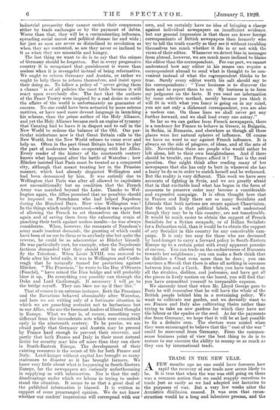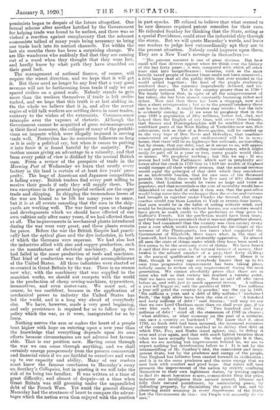TRADE IN THE NEW YEAR.
AFEW months ago no one could have foreseen how rapid the recovery of our trade now seems likely to be. It is true that when the war was still going on there was a common notion that we could reapply ourselves to trade just as easily as we had adapted our factories to the purposes of war. But a very few weeks after the Armistice disillusion ensued. It was seen -that recon- ,strnction would be .a long and laborious process, and the pessimists began to despair of the future altogether. One formal scheme after another hatched by the Government for helping trade was found to be useless; and there was so violent a reaction against e,Oinplieency that the soberest economists" talked of many' years being necessary to bring our trade back into its normal channels. Yet within the last six months there has been a surprising change. We are like wandetera who suddenly find that they are coming out of a wood- when they thought that they were lost, and hardly know by what path they have stumbled on their good luck. The management of national finance, of course, will require the wisest direction, and we hope that it will get it. Ent there need no longer be any fear that a very good revenue will not be forthcoming from trade if only we are spared strikes on a grand scale. Nobody stands to gain more than the workers themselves if trade is left undis- turbed, and We hope that this truth is at last sinking in On the whole we believe that it is, and after the recent orgies of wild talk workers are settling down in most trades, contrary to the wishes of the extremists. Common-sense triumphs over the vapours of rhetoric. Although the Government:cannot-be acquitted of gross mismanagement in their fiscal measures, the collapse of many of the prohibi- tiona: on import's which were illegally imposed is serving trade well., Ifieteotiori has its nuinerouS followers so long as it:is only 'a political cry, but when it' conies to putting it into fOrde it' is' found hatefiil by the majority. Pre- te-di-on-meant giving an ad-vantage to a Minority, and that frohi every point' of view is disliked 'by the normal British man. Froni- a review of the prospects of trade in the MV Pat of Wednesday we learn' that neatly every factory in the land is certain of at least five years' pros- perity. The bogy of Arderican and Japanese competition is fading away. British traders find every port willing to receive their goods if only they will supply them. The two exceptions in the general hopeful outlook are the sugar trade and shipping. In shipping the tremendous losses of the war" are bound to be felt- for many years to dune, but it is at all events consoling that the men in the ship- yards are working well. The war forced upon us changes and developments which we should have effected of our own volition only after Many years, if we had effetted them at all. The improvements in mechanical 'plants introduced during the war were very great, and these plants remain for peace. Before the war the British Empire had practi- cally lost the 'optical glass and the dye industries, in both of Whieh the Germans were supteine. We had also lost the-industries allied with' zinc and copper production, such as the manufacture of electrical machinery. Again, we had failed-in the Mass production of tools and machines. That . kind' of production was the special accompliShment of the United. States: All these industries were started or re-created in Great'Britain by the war. There is no reason now why, with': the machinery that was supplied to the munition works, we should not compete with the world' in the production of cheap" sewing--machines, typewriters, locomotives, and' even motor-cars. We must not, of course, be confident, because' in the application of mechanical' power to industry the United States has led the world, and is a long way ahead of everybody else. We have-, however; made a- very good beginning, and only persistence is required:for us to follow up the pokey which the war, as it were, inaugurated for us by forde.
Nothing merves-the arni or makes the heart of a people beat higher with. hope on entering -upon a new year than the knowledge that everything depends upon its own efforts because circumstances are not adverse but favour- able. That' is our position now. Having come through the war, we can come through- anything, and we shall certainly emerge prosperously from the present commercial and financial crisis if we are faithful to ourselves and work up to our capacity and ability. Many of our readers must know the famous conclusion to Macaulay's essay on Southey's Colloquies, but in quoting it we will take the risk of its being too familiar. It was written at a time of great difficulty; and almost of despair—at a time when Great Britain was still groaning under the unparalleled debt of the French Wars. Yet amid the general dismay Macaulay had the stoutness of heart to compare the advan- tages which the nation even then enjoyed with the position
in past epochs. He refused to believe that what seemed to be new diseases required patent remedies for their cure, He ridiculed Southey for thinking that the State, acting m- a special Providence, could steer the industrial ship through the storm. But we will quote Macaulay's words, and leave our readers to judge how extraordinarily apt they are to the present situation. Nobody could improve upon them. They are a New Year's message in themselves :-
" The present moment is one of great distress. But how small will that distress appear when we think over the history of the last forty years ; a war, compared with which all other wars sink into insignificance ; taxation, such as the most heavily taxed people of former times could not have' conceived ; a debt larger than all the public debts that ever existed in the world added together ; the food of the people studiously rendered dear ; the currency imprudently debased, and im- prudently restored. Yet is the country poorer than in 1790 ? We firmly believe that, in spite of all the' misgovernment of her rulers, she has been almost constantly becoming richer and richer. Now and then there has been a stoppage, now and then a' short retrogression ; but as' to the general tendency-there can be no doubt. A single breaker may recede ; but the tide'' is -evidently coming in. if we were to prophesy that in the year 1930 a population of fifty millions, better fed, clad, and lodged than the English of our time, will cover these islands, that Sussex and Huntingdonshire will be wealthier than the ' wealthiest parts of the West Riding of Yorkshireinow are,' that cultivation, rich as that' of a frower-garden, will 'be carried up to the very• tops of Ben Nevis and Helvellyn, that machines constructed on principles yet undiscovered will be in every house, that there will be no highways but railroads, no-travelling ' but by steam, that our debt; vast as' it seems to us, will appeal to our great-grandchildren le trifling encumbrance; which might easily.be paid off in a 'year or two, many people would think us insane. We prophesy nothing ; but this we say : If any person had told the' Parliament which met' in 'perplexity and terror after 'the crash' in 1720 'that in 1830 th'e wealth of England ' would surpass all their wildest dreams; that the annual' revenue would equal the principal of that debt which they considered as an intolerable burden, that for one man of ten thousand pounds-then living there would be five men of fifty thousand pounds, that' London would be twice' as large and twiod as populous,' and that nevertheless the rate of mortality would have- diminished to one-half of what it then was, that the post-office would bring more into the exchequer;than the excise and customs had brought in together' under' Charles the Second, that' stage coaches would run, from; London to York in twenty-four hourA, that men would be in the habit of sailing without wind; and would be beginning to rideewithout horses, our ancestors would have given as much credit to the prediCtion as they gave' to GI/River's-Travers. Yet the' prediction would have been true; and they would have perceived that it was not altogether absurd, if they had ;considered ' that the country• was then raising every year a sum which would have' purchased the fee-simple of 'the revenue of the Plantagenetsc ten times what supported the Government of Elizabeth, three times what, in the time of Cromwell', had -been thought intolerably oppressive. To almost all men the state of things under which they have been used to live seems to be the necessary state of things. We have heard it said that five per cent. is the natural interest of money, that twelve -is the' natural number of a jury, that' forty shilling; is the natural qualification, of ; a; county voter, Hence 'it is that, though' in every ago everybody lmows' that up to his own time progressive improvement has been taking place, nobody seems to reckon on any' improvement during the next generation. We cannot' absolutely prove that those are in error who tell us that society hae reached a turning point, that' we' have' seen our' best days: But so said all who came before us, and with just'as much apparent reason. ; a year will beggar us,' said the patriots -of 1640: Two millions a yeatewill grind the' country to powder,' Was the' cry in 1660.
Six milli0118 ;a ;year, and a- debt; of fifty ' exclaimed Swift, ' the high allies have been the rain of ;us:" A hundred and forty millions of debt ! ' said Junius ; welt may we say that we owe Lord Chatham more than we shall' ever pay, if 'we owe him such a load as this.' Tivo hundred and forty millions of .debt'l ' cried all; the statesmen of 1783.1in chorus ; what abilities, or what economy on• the pent of a minister, can 'save a country, so burdened ? ' We know that if, since 1783, 'no fresh debt had been incurred, the increased resources of the country would have enabled us to defray that debt at which Pitt, Fox; and Burke; stood aghast, nay, to defray it over and over again, and that with much lighter taxation than what wo have actually borne. On what principle is it that, when we see nothing but improvement behind us, we are to expect nothing but deterioration before us ? It is not by the intermeddling of Mr. Southey's idol, the omniscient and omni- potent State, but by the prudence and energy of the people, that England has hitherto been carried forward in civilisation ; and it is to the same prudence and the same energy that we now look with comfort and good hope. Our rulers will best promote the improvement of the nation by strictly confining themselves to their own legitimate duties, by leaving capital to find its moat lucrative course, commodities their fair price, industry and intelligence their natural reward, idleness and folly their natural punishment, by maintaining peace, by defending' property, by diminishing the price of law, and by observing strict economy in every department of the State. Let the Government do this : the People will assuredly do the rest."











































 Previous page
Previous page